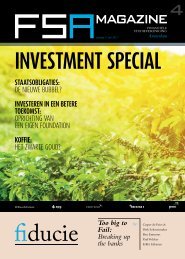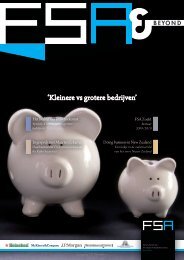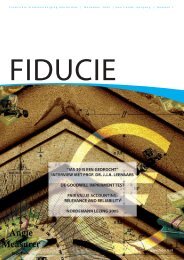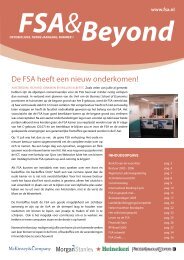You also want an ePaper? Increase the reach of your titles
YUMPU automatically turns print PDFs into web optimized ePapers that Google loves.
74<br />
prof. Dr. casper de vries is program Director<br />
Risk Management at Duisenberg School of<br />
finance.<br />
www.dsf.nl<br />
WHaT Will HappEN To HiGH fREqUENcy TRaDiNG<br />
if a ToBiN Tax iS iNTRoDUcED, aND WHaT<br />
aRE THE coNSEqUENcES foR THE NaTioNS iN-<br />
TRoDUciNG (SUcH) a ToBiN Tax?<br />
(RoGiER koUWENHovEN , vRiJE UNivERSiTEiT)<br />
Of course a Tobin Tax will hamper high<br />
frequency trading. It will have several<br />
other negative implications. First of all,<br />
it will have a negative signaling effect on<br />
the market. Markets will become less informed.<br />
A Tobin Tax causes a reduction<br />
in transparency, which in turn results in<br />
difficulties for the market to value assets.<br />
Secondly, it raises the costs of our pensions<br />
and insurance as these rely heavily<br />
on trading financial products, often<br />
used for hedging purposes.<br />
DSF Expert column<br />
FSA members are asked to direct their themed questions<br />
to a DSF expert in every Fiducie publication.<br />
Read what our expert has to say about the theme of<br />
this issue.<br />
stabiliZing the system:<br />
in search for the weakest link<br />
WHERE SHoUlD REvENUES GaiNED fRoM THE<br />
ToBiN Tax BE USED foR?<br />
(kaSpER faaS, vRiJE UNivERSiTEiT)<br />
Collected taxes should generally be used<br />
to increase the budget of the government<br />
and not be allocated for specific<br />
purposes.<br />
aRE THE So callED BaRNiER pRopoSalS a coR-<br />
REcT Way of ENSURiNG THE iNDEpENDENcE of<br />
accoUNTaNTS oR aRE THE ExiSTiNG RUlES SUfficiENT?<br />
(MaxiME ScHMiTT, vRiJE UNivERSiTEiT)<br />
There currently is -and always will be- a<br />
conflict of interests in the accountancy<br />
sector. This conflict is simply inevitable.<br />
At the moment, there already exists job<br />
rotation within accountancy firms limiting<br />
the accountants’ dependence. There<br />
is a tradeoff between becoming better<br />
informed if one is longer on a specific<br />
job and being captured by the management<br />
of the firm one is supposed to audit<br />
critically.<br />
To WHaT ExTENT Will THE ifRS STaNDaRDS iMpRovE<br />
TRaNSpaRENcy aND REDUcE SySTEMic<br />
RiSk?<br />
(SJoERD kEilMaN, vRiJE UNivERSiTEiT)<br />
Market based valuation gives better<br />
information, but also requires better<br />
interpretation by the user. The interpretation<br />
has not kept up with the changes<br />
in reporting. An example is the Dutch<br />
pension system where liabilities are now<br />
discounted by the market based swap<br />
curve rather than the fixed 4% rate used<br />
before. This causes daily fluctuations<br />
in the solvency ratio of pension funds.<br />
Given the long duration of pension<br />
funds, one should then not immediately<br />
act on these fluctuations. The opposite,<br />
however, has happened by using the old<br />
interpretation. With a fixed rate, high liabilities<br />
would not disappear as interest<br />
rates would move.<br />
HoW SHoUlD coRpoRaTioNS coNTRol iNTER-<br />
Nal fRaUD aND ExcESSivE RiSk?<br />
(laURa DElacoURT, UNivERSiTy of aMSTERDaM)<br />
In general, this is the role of the accountants.<br />
They are responsible set up<br />
controls and thereby prevent internal<br />
fraud and excessive risk. Besides that,<br />
corporations can alter the bonus structure<br />
to prevent excessive risk taking.<br />
Individual bonuses should be structured<br />
as long-term compensation methods. In<br />
the current situation, it is hard to judge<br />
which results are the accomplishments<br />
of specific individuals. In a longer time<br />
frame this becomes easier to judge. It<br />
will also prevent short term gambling.<br />
coNSiDERiNG THE opTioN of EURoBoNDS, HoW<br />
caN yoU GivE pooR pERfoRMiNG coUNTRiES<br />
THE iNcENTivE NoT To BoRRoW aGaiNST availaBlE<br />
cHEapER RaTES?<br />
(MaRc TiMMERMaN, UNivERSiTy of aMSTERDaM)<br />
Because the EU and euro is a treaty organization<br />
of equals, the EU lacks the<br />
hierarchical structure to discipline poor<br />
performing countries. If the European<br />
Union is structured like a federal government,<br />
certain hierarchical levels would<br />
be included. This way overconsumption<br />
by poor performing countries could be<br />
disciplined. In the current situation we<br />
cannot prevent over-borrowing against<br />
cheaper rates. For this reason, I believe<br />
that until we would move to a federal<br />
structure, where at the supra national<br />
level an euro parliament and government<br />
would be able to effectively control debt<br />
sinners, we should not issue euro bonds.











